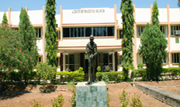National Service Scheme (NSS) was launched on 24th September, 1969, by the then Union Education Minister, Dr. V. K. R. V. Rao in 37 Universities in India with 40,000 students on the Mahatma Gandhiji’s Birth Centenary year. Now spread over to 298 Universities having more than 3.2 million student volunteers. The aim of National Service Scheme is “Development of the Personality of students through Community Service”. The overall aim of NSS is to give an extension dimension to the higher education system and orient the student youth to community service while they are studying in educational institution. The NSS was started to establish a meaningful linkage between the campus and the community. NSS is a youth programme under the Ministry of Youth Affairs and Sports, Government of India. The scheme is funded by Government of India and Government of Tamil Nadu in the ratio 7:5.
NSS Symbol:
The symbol of the NSS is based on the “RATH” wheel of the Sun Temple situated in Konark, Odissa. It represents the cycles of creation, preservation and release, and signify the movement in life across time and space.
NSS Moto:
The motto of NSS is “NOT ME, BUT YOU”. It underlines that the welfare of an individual is ultimately dependent on the welfare of the society on the whole. Therefore, it should be the aim of the NSS to demonstrate this motto in its day-to-day programme.
About GRI NSS cell:
The NSS Cell in Gandhigram Rural Institute – Deemed University (GRI) has organized several programmes to tune the personality of the student volunteers and make them responsible for rural development since 1979-80. The unique feature of NSS in GRI is that all the students studying Diploma, Under Graduate, and Post Graduate (except one year programmes) are NSS volunteers. There are 19 NSS units in the GRI NSS Cell, coordinated by one Programme Coordinator and supported by 19 Programme Officers. Shramadhan, tree plantation in campus and in the adopted villages, and blood donation to the people admitted in the Kasturba Hospital, Gandhigram, and Government Hospital, Dindigul, are regular features. Other important Regular Programmes organized were AIDS Awareness, Awareness Rally on Consumer Rights, Awareness Rally on Save Oil & Gas for Better Living in association with Petroleum Conservation Research Association, Awareness on Health and Hygiene, Encouragement to NSS volunteers to participate in state level programmes and other programmes for a wholesome personality development of the volunteers. Apart from the above, the Tamil Nadu State AIDS Control Society sponsored three units of Red Ribbon Clubs (RRC) which are also functioning in GRI for the promotion of health awareness among the volunteers. Though B.Ed. programme is not covered under NSS, a separate RRC unit is created for this programme. For the successful organization of the NSS Regular and Special Camping programmes necessary support is enlisted from village Youth Clubs, SHGs, Gram Panchayats, District Administration, Rotary Clubs, leading NGOs, Tamil Nadu State NSS Cell, NSS Regional Office, Ministry of Youth Affairs and Sports-Government of India, Tamil Nadu State AIDS Control Society, Food, Civil Supplies and Consumer Protection Department-Government of Tamil Nadu, and Petroleum Conservation and Research Association (PCRA).

